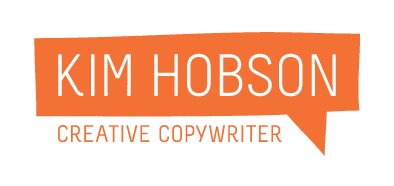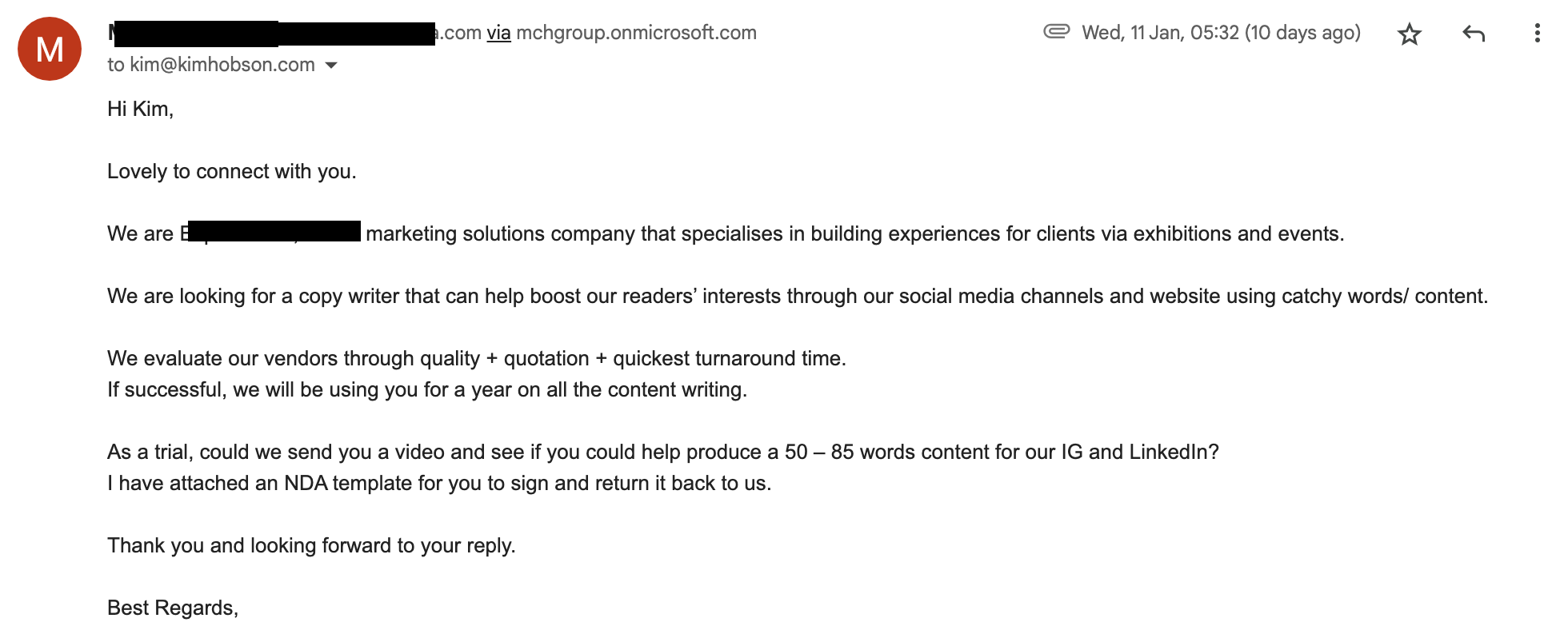Imagine this: a prospective client has hit your inbox looking for someone to help them with a project.
You’re excited!
But then your eyes skim the text and your stomach drops as you land on the words “provide unpaid sample” and “...if successful, future work”.
This brings us to a long-standing question in the freelance community - should freelancers give free samples or complete a free trial to get a freelance gig?
On the one hand, maybe you’ll win the work. On the other hand, what if the client uses the spec work without permission or payment and without extending a paid job offer?
In this article, we take a look at why clients ask for free samples, whether you should complete free trials to get freelance work, how you can limit the risk of being taken for a ride and what you need to weigh up before ever working for free.
A Tale of a Free Trial F*c up…
Let me tell you a sad little story….
When I was first on the hunt for freelance work, a prospective client sent me an email that he was looking for a copywriter to manage the Instagram accounts for his company.
We had a quick chat on the phone then he sent me a follow-up asking if I could show him the type of content I would post and to provide a few samples.
Really wanting to win the job, I sent him a recommendation of 4 content pillars, a hashtag strategy and copywriting for a series of Instagram posts.
Then he ghosted me.
A week or so later, I see my work - the work I didn’t get paid for or give him the authorisation to use - being used on his Instagram channel. The audacity (and my idiocy).
Here was a lesson learnt the hard way and a good reason why freelancers should think twice before giving a free sample to get a freelance gig.
Why do Prospective Clients Ask Freelancers to Complete Unpaid Trial Work?
Being asked to work for free is something that can happen to freelancers at any stage in their career. So why is this situation so common?
They Want to Try Before They Buy
Some clients view hiring a freelancer akin to being in a shoe shop - they want to try on lots of different styles before deciding on the one they want.
While they may see the process of asking for free work similar to an audition, for the freelancer, this means doing unpaid work without the promise of actually being hired.
They Don’t Understand the Work Involved
Some clients don't understand how long it takes to complete what they see as a “small free sample”. The client might just be asking for a sample copy paragraph or web page mock-up, but for the freelancer this means background research, understanding the client’s brand and target market, among other things, which all take time, effort and expertise.
It’s Practice in Some Circles
In the advertising and marketing agency world, it's common practice for companies to submit a request for proposal to several agencies who will pitch their best ideas (free of charge) to win the work (see an episode of Mad Men for more details).
Unlike freelancers, agencies have more resources (people, time and budget) to absorb this unpaid work, and, with a large ($$) contract up for grabs, it’s often worth their time to do a pitch on spec.
Unfortunately, some clients assume this is the process when hiring freelance creatives like writers and designers without realising why it's harmful.
They’re Scammers
There is a certain type of “business owner” who seeks out freelancers to take advantage of them. They’ll often be heard dangling the promise of more lucrative work in the future to get freelancers to give free samples, or soliciting trial projects from sizable numbers of freelancers to get free content to use in their marketing.
On a mission to get something for free, some clients don’t mind who they rip off in the process. Often, they’ll even steal your ideas and shop around for someone to do it cheaper.
Why Freelancers Should Decline to Work for Free
It’s hard to think of many other professions where asking someone to work for free would even be considered, let alone acted upon. Here are some of the reasons you should decline to give free samples as a freelancer:
It Devalues Your Expertise
People don’t value what they don’t pay for.
By positioning yourself as a freelancer that will do work for free, you’re creating a bad value perception for yourself. You’re a professional, not a hobbyist and need to act like a business person by charging for your services and expertise.
You Can’t Earn a Living
There are always going to be clients out there that will gladly take your time and pay you nothing in return, no matter how experienced you are.
Free trials mean money you’ll never see and time you’ll never get back.
Don’t work for clients who want to get something for nothing or have so little understanding of what you do they view paying you as a perceived risk.
Other Clients Will Pay You
It's going to be hard to form a productive working relationship with a client that finds it acceptable for you to be working for free.
There are plenty of great clients out there who respect and value what you do and will understand why you charge what you do. Customers that pay are better quality customers, able to clearly define their requirements with realistic expectations that will work to realistic timelines.
What Freelancers Should Do When a Client Asks for Free Samples
When a client is asking for a free sample, essentially, they want to know that they can trust you.
It’s the freelancer’s job to build that trust and put a client at ease - though I would argue through a portfolio, case studies and testimonials, not through free work or being taken advantage of.
Here’s what you can do before completing that unpaid trial or free sample:
Direct Them to a Stellar Portfolio
If a prospective client reaches out and asks you to complete work as a trial, direct them to your portfolio. The point of a freelance portfolio is to show your experience, track record and capabilities. It’s a showcase for how you can solve problems for clients and acts as a collection of things you’ve done successfully in the past.
You can take a look at my portfolio to get an idea of how I showcase my work.
If a client looks at your portfolio and doesn’t think you can do the work then you should both go your separate ways.
Create Case Studies
As well as promoting your work, case studies do a great job of demonstrating the value your work brings. You can add statistics, testimonials from happy clients and walk them through the step-by-step process – from strategy to creative thinking to deployment – enabling the client to understand what it’s like to work with you.
Have a Process Document On Hand
Many clients won’t fully understand what goes into something which is why they may ask you to work for free. Have a document that showcases the step-by-step process you follow when working with a client.
I’ve had clients change their tune once the process was explained, they see how much time goes into something and why I don’t cut corners to provide free samples. Having a process explainer document shows confidence and professionalism, which will often eliminate many of the “free sample” clients who realise you can’t be taken advantage of.
Propose Ad Hoc Work
Should freelancers charge for samples? Yes. Tell them you don’t give free samples but that they can hire you for a few hours at your hourly rate to deliver a small piece of the project. If they like what you deliver they can hire you for the rest of the job, if they don’t, you can both move on.
Ask for Free Samples of Payment
Joking! But how satisfying would that be?
When is it OK for Freelancers to do Spec Work for Clients?
There are some instances where completing a small unpaid trial or free sample might be advantageous for a freelancer. The important part is knowing when it's going to win you work, and when it’s not.
Should freelancers give free samples? Answer these three questions first:
1.How Established are you as a Freelancer?
Experienced freelancers usually don’t need to do things for free because they have regular clients, high salary expectations and strong portfolios where the work speaks for itself. Top-notch freelancers get to pick and choose who they want to work with, not the other way around.
However, if you are new to the freelance game or you’re still building a portfolio and have time to spare, doing a free sample can be a good way to secure paid work. It can also be a great way to hone your skills and develop your portfolio - but that brings me to my next point…
2. What do you Stand to Gain?
Weigh up the time it will take to complete the free sample against the potential benefit of paid work, repeat business or landing larger projects.
If doing a small sample post on Instagram can lead you to a monthly social media retainer, it's probably worth it.
3. Who is the Client?
Be picky about to whom you’ll deliver a free sample. I heavily preach against free samples, but if my dream company approached me and asked me to give them a (small) taste of what I could write for them, I would probably jump at the chance to send it over.
If this potential project is going to look great in your portfolio or help you to break into a new niche, doing a free sample might be worth it.
What Freelancers Need to do Before Giving a Client a Free Sample
If you’ve decided it’s worth completing the requested free sample, here are ways to limit the chance you’ll be taken for a ride:
The image above is a recent email from a potential client asking me to give them a trial copywriting sample. There were a few things missing here before I would consider it:
1.What’s their Budget for this Work?
Be sure to have clear visibility on the scope of work, then tell them how much you charge for that. You want to know they can afford you before you sink time into delivering a free sample for them to love the work but be unable to meet your fee.
2. Make them Sign a Contract
Should freelancers give free samples? If you do, you must have a contract in place. The contact should state that you retain ownership of the trial work and the client cannot use the free sample internally or externally unless they hire you for the work. If they don’t hire you for the project the trial piece should be destroyed.
3. Beware of Penny Pinchers
Be cautious of clients that say things like “We evaluate our vendors through quality + quotation + quickest turnaround time”, which essentially means we’re looking for the cheapest thing we can get away with and don’t really care about your skill set.
(When I replied to the above email asking for clarity on scope of work and asked if they would sign an agreement not to use the trial piece, I didn’t get a reply back - this happens. Luckily I’m not desperate for work and didn’t want to enter into a race to the bottom when it came to pitching for this).
So, should freelancers give free samples and work for free by completing an unpaid trial? I’m adamant that freelancers should do their best to avoid working for free at all costs. Remember to be confident, act professional and value yourself and your time - it’s OK to redirect a client to your portfolio or simply explain you don’t give free samples because some clients have used them in the past without permission or payment.
However, for dream clients or if you're less experienced, there are instances where it might make sense to make an exception. If you are considering doing that unpaid sample, make sure you have a contract in place and clear visibility on their budget beforehand!
What do you think? Should freelancers give free samples? Have you ever completed a free trial to win freelance work?







Freelancing is known for its unpredictability. Sooner or later, you’ll have to deal with freelance client loss. But rather than let it get you down, here are my tips on bouncing back and making your freelance business even better.